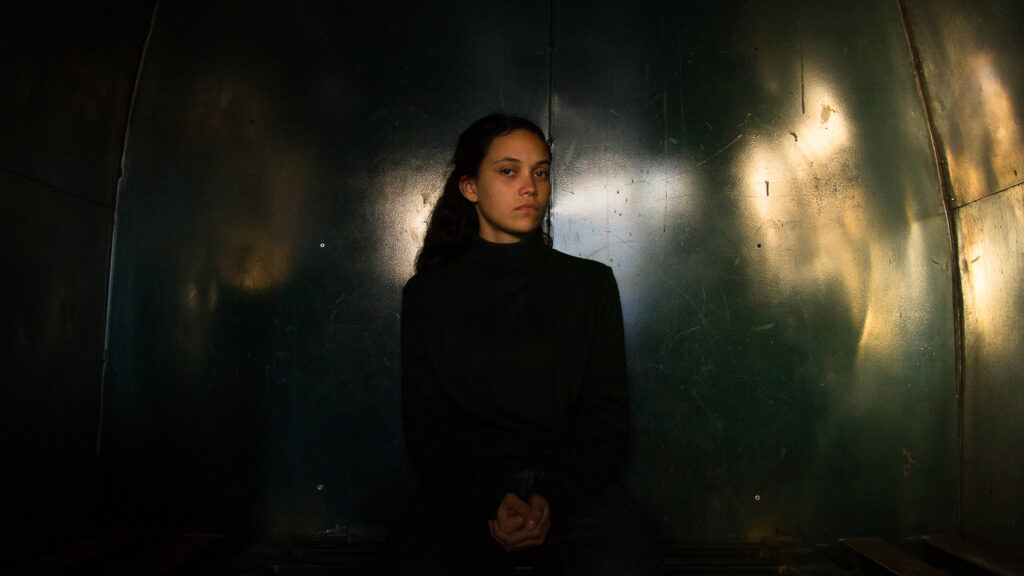Vassilis Kroustallis reviews the Chilean social drama 'Blanquita' by Fernando Guzzoni.
'Blanquita', the third feature by the Chilean filmmaker Fernando Guzzoni, is a well-ordained test in letting things go, and characters unfolding their own secrets and motivations. Based on the ‘Spiniak Case’, a pedophilia and child prostitution network (on top of which a Chilean businessman presided), it is more focused on the victims -and a certain victim in particular. The 18-year-old Blanquita (Laura López) lives in a Christian shelter home along with other child victims of the famous Pablo Kahn -now investigated for a multitude of child rape and abuse allegations that took place in his home. The shelter is run by Father Manuel (Alejandro Goic), a rather stern middle-aged priest, who will travel the world to get the criminals indicted. The problem is that many children (a harrowing scene at the beginning of the film with one of them) are too psychologically influenced by those events to stand the rigorous trial examination -and they led to the danger of being self-contradicted.
But Blanquita looks like a model witness. A young mother, who's able to take care of her daughter, is troubled and angry with the perpetrators, and the abuse she experienced; this won't affect both her determination to testify and her mental clarity to narrate the events -even giving more information to the two government officials whom she visits than actually needed. Father Manuel approves and guides her; so is this all real or fake?
Guzzoni proceeds cautiously here not to whitewash the culprits by doubting Blanquita's veracity; after all, her testimony would be one of many. He is successful in shading the other main character of the film, Father Manuel -in many ways, an equal counterpart, and protagonist. Goic's tight face muscles and commanding voice make him more the likely villain of the film, which plays with morality in a cat-and-mouse game, both inside the shelter home and outside of it.
Blanquita won't tell the story of moral ambivalence, and it is really easy to pick up the pieces together about the story's own veracity in the first half of the film; the drama arises from the 'when' part of the moral deliberation and the 'why' rather than the 'what'. Guzzoni sometimes resorts to too easily staged forest walks (outside the confines of the offices and the shelter), where everything is revealed (and sometimes buried) among the many players of the film. Blanquita as a character is precisely defined as a person who simply suffers from the lack of a healthy community besides her; less than a martyr or an accuser, she's simply a loner (like Jesus was in Guzzoni's previous feature, only with more anger). The film accompanies both her limited past happy excursions to fairground attractions and to her only romantic relationship with a boy (who will prove to be the catalyst of the film's secrets).
The church is clearly defined as a culprit in the film and an institution that conceals rather than showcases; that makes Father Manuel's efforts to get the rapers punished more morally elevated (he is derogatorily described as 'a prophet' by the cardinal and his superior). This contrast baffles our perception of his deeds; the film's other events tell a completely different (and darker) story of a moral crusader rather than an enlightened person fighting the church system.
'Blanquita' starts from the tense and, as the events unfold, it moves to the more sincere and the point where the character has to part with their illusions. The central conflict between telling a lie to make up for an otherwise true event is constantly showcased against the 'thou shall not bear false witness, accompanied by musical bells and a slightly unnerving soundtrack. Cinematography goes directly for the moody darkness of a social call film, and sometimes (especially in the shelter scenes which are lit like prisons) highlights what the dialogues leave open.
'Blanquita' is more of a moral exercise than a treatise; it won't surprise or pose more questions than we already know about. It is done competently, and its character duo is always ready to climb up or down the moral ladder -making the film in turn a valuable experience to watch.
'Blanquita' screeend at the 79th Venice Film Festival (Orizzonti Section)
Vassilis Kroustallis

